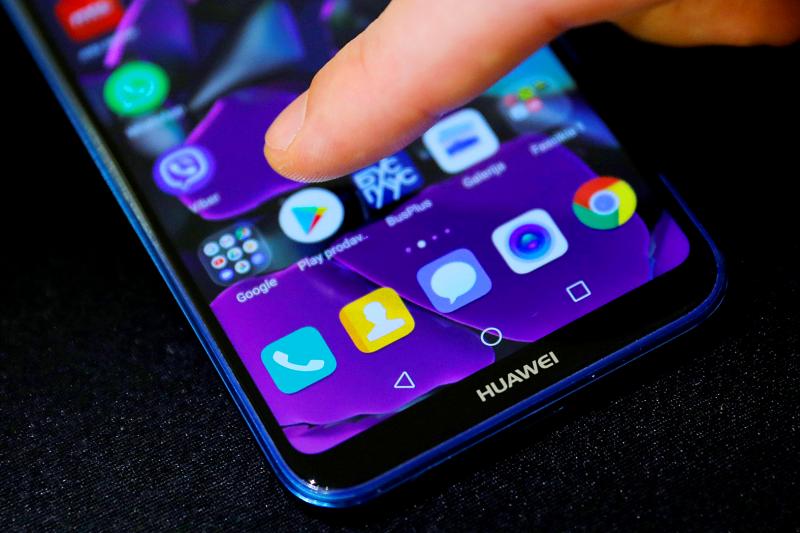A ban on Chinese-made electronics for government use took effect yesterday, with central and local government agencies reporting a near-total replacement of such devices, a source familiar with the matter said yesterday.
Speaking on condition of anonymity, the official said that only in a few cases did the Executive Yuan grant approval to certain agencies to retain electronic products made in China for training or evaluation purposes.
The source declined to elaborate on brands, models and the quantity of Chinese-made equipment still in use, citing the sensitivity of the information.

Photo: Reuters
Products by Huawei Technologies Co (華為) are under particular scrutiny due to the company’s links to the Chinese military, the source said.
Another priority is the prohibition of personal devices used in government agency networks, they said.
The administration of President Tsai Ing-wen (蔡英文) has been reticent about the prevalence of Chinese electronics in government agencies prior to the ban.
In a document dated May last year, the Executive Yuan said that 19,256 electronic devices — including 4,556 Chinese-made drones and security cameras — were utilized in 2,596 agencies, including schools.
The most prevalent Chinese manufacturers of drones and cameras in use were SZ DJI Technology Co (大疆創新), TP-Link Technologies Co (普聯技術) and Hangzhou Hikvision Digital Technology Co (海康威視), it said.
The Executive Yuan announced the ban in December 2020, citing information security concerns. It prohibits Chinese electronics from government use, personal software on work devices and personal electronics in government networks.
The Executive Yuan also said that all local and central government agencies must account for Chinese electronics used by contractors and subcontractors, urging them to replace the equipment before this year.

The Ministry of Foreign Affairs (MOFA) yesterday said it is closely monitoring developments in Venezuela, and would continue to cooperate with democratic allies and work together for regional and global security, stability, and prosperity. The remarks came after the US on Saturday launched a series of airstrikes in Venezuela and kidnapped Venezuelan President Nicolas Maduro, who was later flown to New York along with his wife. The pair face US charges related to drug trafficking and alleged cooperation with gangs designated as terrorist organizations. Maduro has denied the allegations. The ministry said that it is closely monitoring the political and economic situation

Conflict with Taiwan could leave China with “massive economic disruption, catastrophic military losses, significant social unrest, and devastating sanctions,” a US think tank said in a report released on Monday. The German Marshall Fund released a report titled If China Attacks Taiwan: The Consequences for China of “Minor Conflict” and “Major War” Scenarios. The report details the “massive” economic, military, social and international costs to China in the event of a minor conflict or major war with Taiwan, estimating that the Chinese People’s Liberation Army (PLA) could sustain losses of more than half of its active-duty ground forces, including 100,000 troops. Understanding Chinese

UNRELENTING: China attempted cyberattacks on Taiwan’s critical infrastructure 2.63 million times per day last year, up from 1.23 million in 2023, the NSB said China’s cyberarmy has long engaged in cyberattacks against Taiwan’s critical infrastructure, employing diverse and evolving tactics, the National Security Bureau (NSB) said yesterday, adding that cyberattacks on critical energy infrastructure last year increased 10-fold compared with the previous year. The NSB yesterday released a report titled Analysis on China’s Cyber Threats to Taiwan’s Critical Infrastructure in 2025, outlining the number of cyberattacks, major tactics and hacker groups. Taiwan’s national intelligence community identified a large number of cybersecurity incidents last year, the bureau said in a statement. China’s cyberarmy last year launched an average of 2.63 million intrusion attempts per day targeting Taiwan’s critical

‘SLICING METHOD’: In the event of a blockade, the China Coast Guard would intercept Taiwanese ships while its navy would seek to deter foreign intervention China’s military drills around Taiwan this week signaled potential strategies to cut the nation off from energy supplies and foreign military assistance, a US think tank report said. The Chinese People’s Liberation Army (PLA) conducted what it called “Justice Mission 2025” exercises from Monday to Tuesday in five maritime zones and airspace around Taiwan, calling them a warning to “Taiwanese independence” forces. In a report released on Wednesday, the Institute for the Study of War said the exercises effectively simulated blocking shipping routes to major port cities, including Kaohsiung, Keelung and Hualien. Taiwan would be highly vulnerable under such a blockade, because it